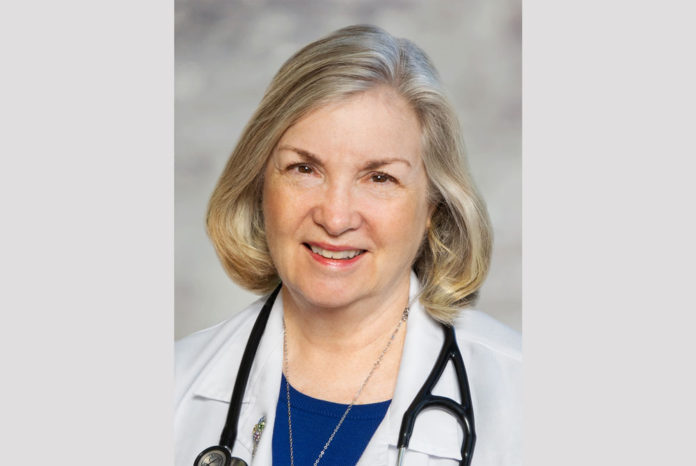Everyone would like to be done with COVID, but the surge this summer showed that precautions are still necessary. This fall, people are wondering when the next COVID booster will become available, whether to get a flu shot, and who is vulnerable to respiratory illnesses that tend to go around during the holiday season. Dr. Dianne C. Martin, Internal Medicine and Infectious Diseases, Washington Hospital Healthcare System, spoke with Tri-City Voice on what people can do to keep themselves and their loved ones safe. The below facts are summarized from the information she shared.
Why did we have such a big surge this summer?
The strain circulating Summer 2024 isn’t making people as sick as some earlier strains. Martin says, “Because the symptoms are so mild, people don’t really connect and say, ‘This might be COVID.’” People then unfortunately go on to infect others. Heat waves have also driven more people indoors where air circulation is worse.
Who needs a vaccine?
Whether it’s flu, COVID, pneumonia or RSV, there’s a lot of overlap among those who are most vulnerable: people who are immunocompromised for any reason; those on dialysis; people undergoing chemotherapy; those with heart disease or respiratory problems, and those over 65. Even if you’re not especially vulnerable, it’s a good idea to get your fall flu vaccine, and a COVID booster when the new one comes out. This helps protect others. Adults usually get the pneumonia vaccine every five to 10 years, and kids before starting school.
When will the next COVID booster come out?
The Centers for Disease Control and Prevention (CDC) hasn’t announced exactly when the next booster will be available, but according to Martin it may be as early as mid-September.
Will I have to pay for my COVID booster?
Unfortunately, COVID vaccines are no longer free across the board. However, most insurances, including Medicare, will cover them.
Can I get a COVID and flu vaccine at the same time?
Yes, just get them on different arms. Patients may experience more severe side effects such as headache, fatigue and injection site reactions. These are temporary. Martin advises, “You may want to [get both vaccines] on Friday afternoon when you’re not going to do anything on Saturday.”
Is the COVID vaccine safe for pregnant people?
Yes! In fact, because the COVID vaccine isn’t available for infants under six months old, newborns can gain some immunity from their mothers who take the vaccine while pregnant.
Who should get a flu vaccine?
Adults and kids over six months old. Intranasal vaccines are available too. It’s strongly recommended that seniors get a special high dose flu vaccine that’s more effective (ask at the pharmacy).
I have an egg allergy. Is the flu vaccine safe for me?
The vaccine Flucelvax has no egg products and is safe for those with severe allergies.
Can I get the flu from the vaccine?
No, you can’t. Either the viruses are killed or the vaccine doesn’t include flu viruses.
From a CDC doc: www.cdc.gov/flu/pdf/freeresources/general/strong-defense-against-flu.pdf
Flu shots are made using killed flu viruses (for inactivated vaccines), or without flu virus at all (for the recombinant vaccine). So, you cannot get the flu from a flu shot.
What do I do if I get COVID?
Stay home to recover, and take fever reducing medication such as acetaminophen—or aspirin or non-steroidal anti-inflammatories if prescribed by your doctor. Paxlovid can help with the symptoms, so check with your doctor even if your case is mild. Paxlovid can interact with some common medications, such as cholesterol meds, but it’s usually safe to stop taking those for a week.
If I’m sick, can I still access medical care?
Martin advises those who have tested positive for COVID, or who are experiencing symptoms like cough or fever to do a phone or video consult. She explains, “We don’t want our staff to get infected or other people sitting in the waiting room to get infected. If you’re sick, contact your doctor to see what you can do and stay home until you feel better.”
What other precautions can I take to stay healthy?
Martin says, “Your best protection is A) the Vaccine and B) If you’re sick, stay home.” Masking in crowded settings and indoor settings also helps. Masks are safe to reuse for four to five days, as long as they aren’t wet from droplets. Just hold the mask by the straps to avoid touching contaminated areas and keep the mask in a clean paper bag when not in use.
Where can I go for accurate information?
The CDC website is reliable and user friendly. It updates information often: www.cdc.gov/covid/index.html
I feel bad for flaking on people when I’m feeling mostly OK….
It can feel awkward to bring up topics like infectious disease when planning social gatherings. But it’s important to take care of each other. Martin says, “You don’t want to call your friend and say, ‘I can’t come, I’m sick. But if that was my friend I’d say, ‘Thank you very much for staying home to take care of yourself and not share infection!’”
Overall, the things people can do to avoid illness are simple. But they do require intentionality. Martin summarizes, “It’s accepting responsibility that if you’re sick and you’re going to be with someone else, you might pass it on. And you might have a mild illness, but maybe they have something they haven’t told you about—they’ve just started chemo therapy, or something—and they might get sicker. This is not rocket science. Everybody’s immune system is different. And what gives one person a 1% mild case, the next person may be more severe.”




